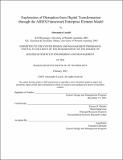| dc.description.abstract | Never before has disruption arising from digital transformation been more starkly obvious and relevant than amid the ongoing COVID-19 global pandemic with the increasing focus on digitalisation to address the many challenges presented by public health orders that limit human-human interaction.
Whilst a global pandemic is inherently a disruptive event, catalysing and bringing to the fore other disruption, change as a result of digital transformation has been present in business for at least the last decade manifesting in such things as change in business ecosystems and stakeholder landscapes (amongst others). Consequently, such fundamental, transformative change has invited a deeper understanding of emergent trends by many researchers from various domains. Arguably however, a piecemeal rather than holistic approach to exploring different enterprise elements has dominated.
Using a semi-systematic literature review methodology, this thesis purposefully takes a holistic approach to contribute a meta-analytical synthesis of findings and observations to the existing body of knowledge. By anchoring and structuring the research around the ARIES Framework Enterprise Element Model, and leveraging object-process methodology and diagrams from the systems thinking discipline, this thesis explores a cross-section of research domains using the Scopus® database of curated academic literature in addition to other select, reputable sources. Distilling findings across the ten ARIES Framework enterprise elements, this thesis finds that digital transformation is profoundly transformative for enterprises because it is fundamentally about organisational change rather than simply technological adoption. Consequently, enterprises often cited as exemplary and characterised as digital natives: (a) embrace necessary change around organisational elements such as culture, leadership, creativity and knowledge management in support of their digital aspirations; (b) challenge established paradigms of technology integration and digitalise processes at all levels of the enterprise; (c) readily pivot to new business models which capitalise on coopetition, leverage reduction in information asymmetry between the enterprise and its customers, and support monetisation opportunities for information assets; (d) make no distinction between enterprise and digital strategy; (e) are anticipant of the cybersecurity policy landscape; and (f) continuously evaluate the enterprise in light of emerging decentralised and democratised solutions to societal needs. \
The culmination of the observations and findings is a single, unified object-process diagram or ‘blueprint’. The blueprint characterises an enterprise-wide response to the disruptive, emergent trends arising from digital transformation synthesised from the research, and provides a holistic birds-eye view and orientation for addressing digital transformation across an enterprise. | |
